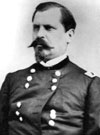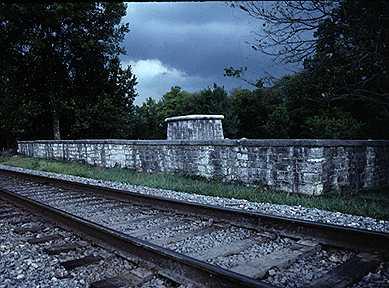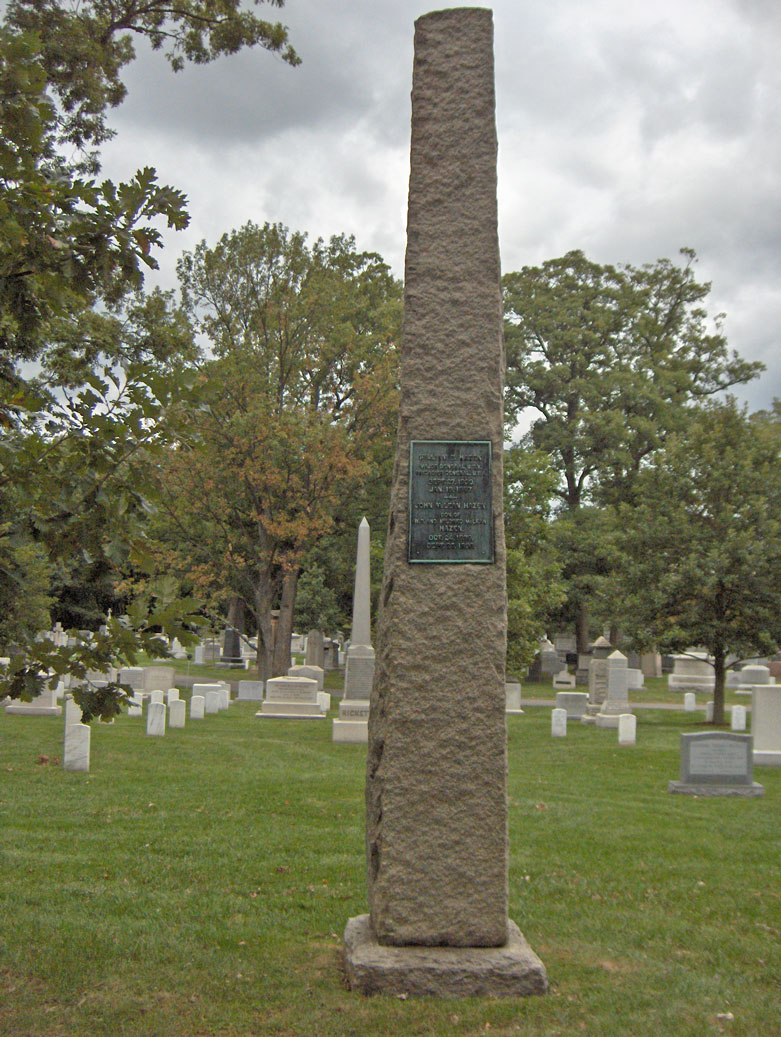William Babcock Hazen was born at West Hartford, Vermont, September 27, 1830; however, at age 3 parents took him to Hiram, Ohio, where he spent his boyhood and where he formed close friendship with James A. Garfield.
He graduated at the United States Military Academy at age 25, (class of 1855) with the brevet of Second Lieutenant of Infantry. His pre-Civil War service was mainly in the Pacific Northwest and in Texas, where was severely wounded in a fight with Comanches in 1859. From then until 1861 he was on sick leave, disabled by wounds, but promoted to Captain of the 8th Indiana Infantry with the reorganization of army following the fall of Fort Sumter.
In October 1861 became Colonel of the 41st Ohio, and the following spring commanded a brigade of Don Carlos Buell's Army of the Ohio and on the second day of Shiloh. With promotion to Brigadier General in April 1863, Major General in April 1865, he took a most commendable part in the successive battles of Perrysille, Stone's River, Tullahoma, Chickamauga, Chattanooga, Knoxsville, Atlanta, the “March to the Sea,” and the Carolinas. In August 1864, took command of 2nd Division of XV Corps and in May 1865, led the Corps in the grand review in Washington, DC.
By end of war had received all brevets through Major General in the Regular service and in July 1866, was appointed Colonel of the 38th United States Infantry, transferring to the 6th United States Infantry in 1869. He put in years of duty on the
Western frontier, visited Europe as observer with German armies during the Franco-Prussian War, became involved in post trader dispute, testifying to extravagance and corruption which marked the system, which resulted in resignation of Grant's Secretary of War, William W. Belknap. In 1880, Rutherford B. Hayes appointed him Chief Signal Officer with the staff rank of Brigadier General, a post he held until his death.
Because of Signal Corps management of the Weather Bureau, A. W. Greely's Arctic Expedition of 1881 came under his command and he was bitterly critical of the supines of the Secretary of War Robert Todd Lincoln in failing to authorize relief for the expedition. His censure earned him a general court headed by Gen W. S. Hancock which resulted in his being reprimanded by President Cleveland for “unwarranted and captious criticism” of his superior, meaningless chastisement since experts were agreed that he was right. When rescued in 1884, only 7 of party's 25 members were alive.
Hazen died in Washington, D.C., January 16, 1887, and was buried with full military honors in Arlington National Cemetery (Section 1, Grave 15)
NOTE: Mildred McLean Hazen Dewey was the daughter of Washington and Mary Darneal McLean. She was born in Cincinnati, Ohio, in 1850. Washington McLean was the owner of the Cincinnati Enquirer and was a prominent figure in the Democratic Party.
Mildred McLean married General William B. Hazen, a career soldier of Civil War and Indian War fame, in 1871. They had a daughter who died in infancy and a son who died at the age of twenty-two in 1898. General Hazen died in 1887. Mildred Hazen became a fixture of Washington, D.C., society and married Admiral George Dewey in 1899. Mrs. Dewey died February 21, 1931.
William B. Hazen Brigade Monument, Stones River, Tennessee
The first Civil War Monument stands along the Stones River Monument on the Stones River Battlefield. Erected in 1863 by soldiers of Colonel William B. Hazen's Brigade, the stone cube commemorates the stand made by Hazen's troops in this thick area of battle dubbed, “Hell's Half Acre.” The graves of fifty-six fallen members of Hazen's brigade surround the monument.
From The N.Y. Times, January 17, 1887
OBITUARY
GEN. WILLIAM B. HAZEN.
Chief signal officer William B. Hazen died at 8 o'clock last evening in his room at No. 1, 305 F-street, Washington, D.C. Although he had been in bad health for a long time, his death was wholly unexpected up to yesterday morning. A short time ago Gen. Hazen obtained a leave of absence for a year, which time he proposed to spend in resting and recuperating his health. He had been troubled for several years with an affection of the kidneys, and had at times suffered severely. Recently, however, he had greatly improved, and it was hoped that a year's cessation from work would result in his complete recovery.
On Thursday evening Gen. Hazen attended the President's reception. In some way he caught a hard cold that evening, and on Friday he remained in bed with no thought that his sickness was dangerous. On Saturday he was so much better that he sat up during the day, and said he should go to his office on Monday. Late Saturday night the General felt worse, and very early Yesterday morning Dr. Philip F. Harvey, Assistant Surgeon in the army, was sent for. The physician found his patient in an alarming condition, and giving evidence that his blood had been poisoned through diabetes. Dr. Harvey felt that the situation was critical, and at his suggestion Dr. David L. Huntington, also of the army, was called in consultation. Then the relatives of Gen. Hazen, now in Washington, were told that the Chief Signal Officer could not hope for many more hours of life, and they gathered in the sick room. Their hopes were revived during the middle of the day, when the General rallied a little, but in the afternoon he grew steadily worse, and finally sank into unconsciousness. Dr. N.S. Lincoln was invited to assist the other physicians at the request of the patient's relatives, but the disease had passed beyond the skill of the doctors, and Gen. Hazen breathed his last at 8 o'clock. At the end he suffered no pain, and he died, without a struggle, of diabetic coma. By his bedside were Mrs. Washington McLean, Gen. Hazen's mother-in-law, and Capt. and Mrs. A.H. Burgher, of Cincinnati, his brother-in-law and sister-in-law. Washington McLean, his father-in-law, was not well enough to attend. These are all of Gen. Hazen's relatives now in Washington. Mrs. Hazen is in the south of France, where she went a few months ago for her health. With her is the General's only son, a lad about 10 years of age.
Gen. Hazen had been in the military service since 1855, when he was graduated at West Point and was assigned to frontier duty at Fort Reading, California. For two years he served at different posts in that section of the country and saw some indian fighting. Then he was transferred to Texas, remaining there until 1859. Disabled by wounds, he obtained leave of absence returning to duty in February, 1861, as Assistant Instructor of Infantry Tactics at West Point. During that service he was made a Captain. In October, 1861, he entered the field as Colonel of the Forty-first Ohio. He remained in the field throughout the war, becoming a Brigadier-General in 1862 and a Major General in 1864. The brevet of Major General in the regular army was bestowed upon him in March, 1865.
Shortly afterward he was regularly commissioned Colonel of the Thirty-eighth Infantry, from which he was transferred in 1869 to the Sixth Infantry. In November, 1869, he went to Europe on leave of absence. He was with the Prussian Army during the investment of Paris, and on his return wrote a book called “School and Army of France and Germany.” Frontier duty then occupied him until 1877, when he became Military Attache of the United States Legation at Vienna. In 1874 he wrote a book on “Barren Lands in the Interior of the United States.” From his return from Vienna until Dec. 15, 1880, when he was appointed Chief Signal Officer, with the rank of Brigadier General, he spent most of his time in Washington.
Gen. Hazen's temperament was aggressive and disputatious. During the latter part of his career, if not in early life, he made his way by a display of these characteristics that did not help his popularity among army officers. He married a daughter of Washington McLean, of Cincinnati, and social influences came to his aid in getting the post of Signal Officer and perhaps in retaining it. It had been filled by a Brigadier General. Much resentment was accordingly felt in the army that a Colonel should be elevated to it. The agitation at that time in favor of transferring the Signal Service to a civil department had many advocates in the army as a consequence of Gen. Hazen's promotion. His official life bore him a good deal of trouble in various ways, particularly in connection with the ventures into the arctic regions which he undertook to relieve. Of late, however, he had been getting along quietly. He was very pleasantly situated in Washington, living in one of the finest houses in that city – a gift to his wife from her father – and enjoying means for all the social advantages to be had there, of which he was fond.
Mildred McLean Hazen Dewey was the daughter of Washington and Mary Darneal McLean. She was born in Cincinnati, Ohio, in 1850.
Washington McLean was the owner of the Cincinnati Enquirer and was a prominent figure in the Democratic Party. Mildred McLean married General William B. Hazen, a career soldier of Civil War and Indian War fame, in 1871.
They had a daughter who died in infancy and a son who died at the age of twenty-two in 1898. General Hazen died in 1887. Mildred Hazen became a fixture of Washington, D.C., society and married Admiral George Dewey in 1899. Mrs. Dewey died February 21, 1931.
When the Hazens went to Washington they built a handsome residence at the northwest corner of Sixteenth and K streets, in which they lived until December, 1886, when Mrs. Hazen and their ten year old son, John McLean Hazen, went abroad; they rented the home and General Hazen took up quarters in rooms at 1307 F Street N. W.
The death of General Hazen, announced on Monday, January 17, 1887, was a terrible shock to his friends, as he had been in better health than usual for some time. The Thursday before his death he attended the diplomatic reception at the White House, where he caught a slight cold which aggravated a diabetic condition. He was attended by his mother-in-law, Mrs. McLean, his sister, Mrs. Bugher, and Captain Adolph Washington Greely, who were with him until death closed his career. The sad news was cabled to Mrs. Hazen in France.
HAZEN, W B
- BRIG GEN CHF SIG OFFICER
- DATE OF DEATH: 01/16/1887
- BURIED AT: SITE 15
ARLINGTON NATIONAL CEMETERY
HAZEN, JOHN MCLEAN S/O W B
- DATE OF DEATH: 09/15/1898
- BURIED AT: SECTION OFF S SITE LOT 15
ARLINGTON NATIONAL CEMETERY - SON OF WB HAZEN, B GEN USA
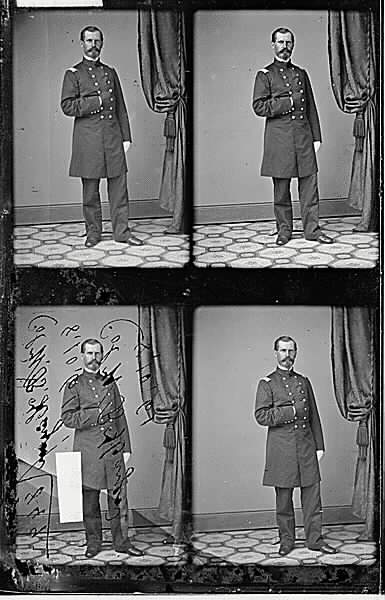
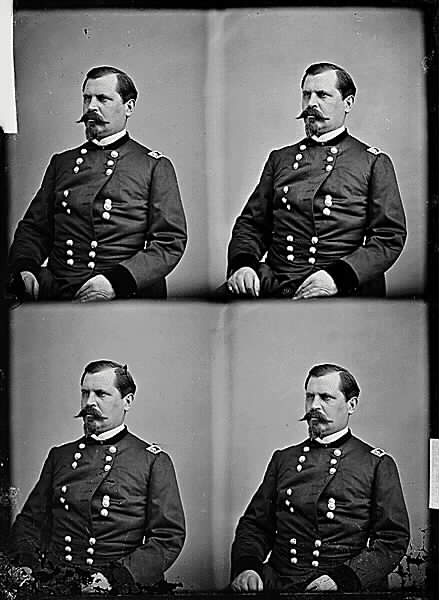
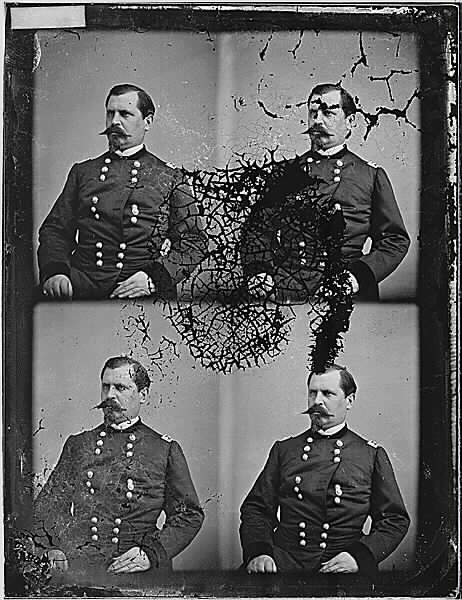
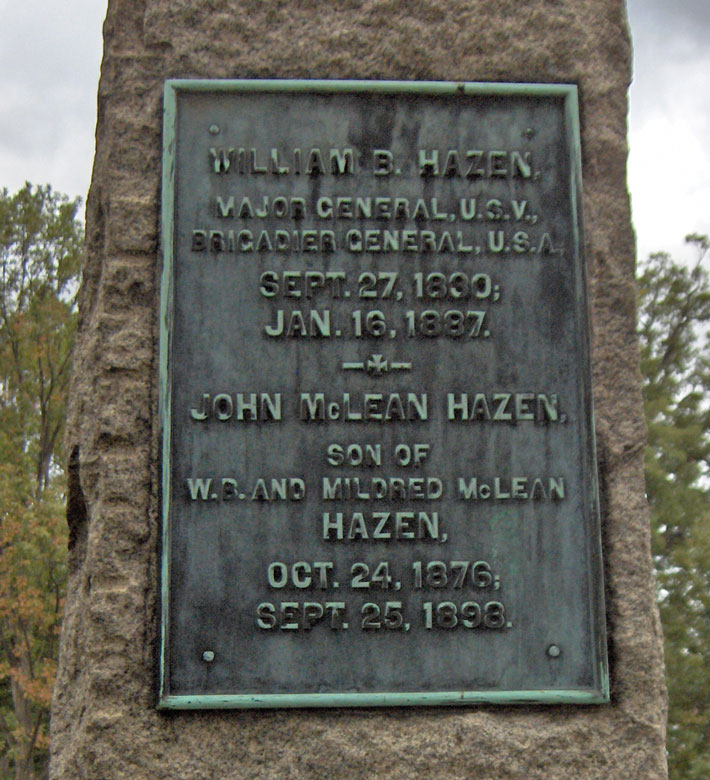
Michael Robert Patterson was born in Arlington and is the son of a former officer of the US Army. So it was no wonder that sooner or later his interests drew him to American history and especially to American military history. Many of his articles can be found on renowned portals like the New York Times, Washingtonpost or Wikipedia.
Reviewed by: Michael Howard

